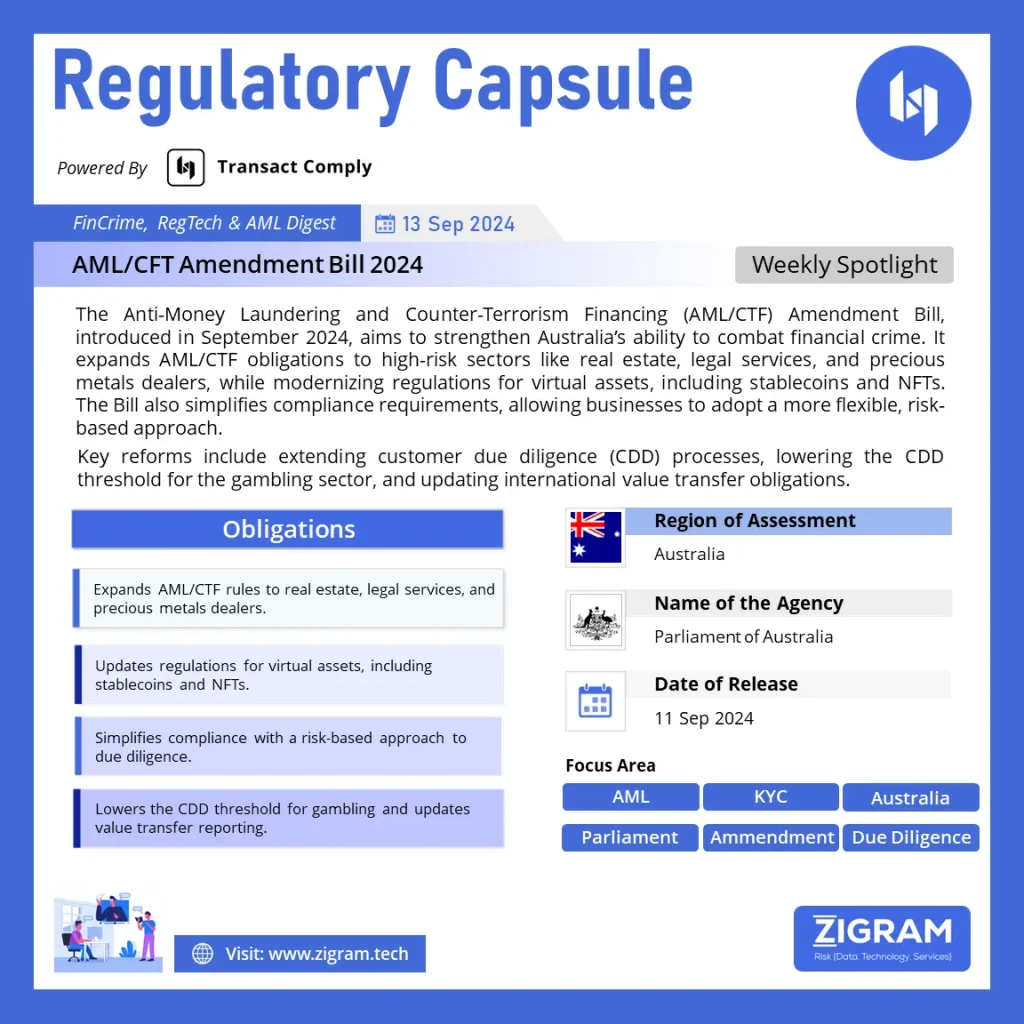Regulation Name: AML/CFT Amendment Bill 2024
Publishing Date: 11 September 2024
Region: Australia
Agency: Parliament of Australia
On September 11, 2024, the Australian government introduced the Anti-Money Laundering and Counter-Terrorism Financing (AML/CTF) Amendment Bill to Parliament, signaling significant reforms to the country’s financial crime prevention framework. The bill aims to modernize Australia’s ability to detect, deter, and disrupt illicit financial activities, aligning the regime with global standards set by the Financial Action Task Force (FATF).
The Bill, if passed, would amend the AML/CTF Act of 2006 to ensure that Australia can effectively counter money laundering and terrorism financing (ML/TF) activities, which have continued to plague its economy. Australia is often seen as an attractive location for laundering proceeds of crime and, without meaningful reforms, the nation risks becoming a hub for serious organized crime.
The Bill is a result of extensive consultation, receiving input from over 270 submissions between April 2023 and June 2024 from various stakeholders, including national security, law enforcement, and regulatory agencies.
Key Objectives Of The Bill
The Bill targets three main objectives:
1. Expanding AML/CTF Obligations: Extending the AML/CTF regime to high-risk services provided by businesses in tranche two sectors, such as real estate, precious metals dealers, and legal professionals.
2. Modernizing Digital Assets Regulation: Strengthening regulations around digital currencies and virtual assets to counter criminal exploitation in these rapidly evolving sectors.
3. Simplifying Compliance: Streamlining the AML/CTF framework to reduce regulatory complexity, offering businesses more flexibility in compliance, and encouraging better risk management to detect and prevent financial crimes.
Expanding AML/CTF To Tranche Two Entities
A significant portion of the Bill focuses on widening the scope of AML/CTF obligations to include real estate agents, dealers in precious stones and metals, lawyers, accountants, and trust service providers. These professions are widely recognized as high-risk for money laundering globally.
The Bill also aims to preserve legal professional privilege, ensuring that while legal practitioners are brought under the AML/CTF regime, they are still able to protect their clients’ confidentiality where appropriate.
Strengthening Virtual Asset Regulation
The Bill would introduce new regulatory measures specifically targeting virtual assets, extending beyond the current scope, which covers exchanges between virtual assets and fiat currencies. The updated regime will now cover:
– Exchanges between virtual assets
– Virtual asset transfers
– Custody services for virtual assets
– Participation in token offerings
This expansion reflects the rapid growth of the virtual asset sector and seeks to prevent it from becoming a weak link in financial crime prevention. It also updates the terminology in the AML/CTF Act by replacing “digital currency” with a more comprehensive definition of “virtual asset”, which will now include stablecoins and non-fungible tokens (NFTs).
Changes To Financial Sector Regulations
The Bill introduces several updates aimed at the broader financial sector, including:
– A more cohesive value transfer framework that integrates the existing concepts of funds transfer and remittance arrangements.
– Streamlined International Value Transfer Service (IVTS) obligations to improve the transmission of key data across borders.
– A refined definition of bearer negotiable instruments, which will reduce unnecessary regulatory burdens by aligning it with FATF standards.
Customer Due Diligence (CDD) And Program Reforms
A core focus of the Bill is improving customer due diligence processes. The Bill seeks to reframe existing CDD requirements by focusing on risk-based approaches rather than tick-box compliance. Reporting entities will now need to:
– Assess and mitigate risks associated with money laundering, terrorism financing, and proliferation financing.
– Ensure that enhanced due diligence is applied in higher-risk situations.
– Lower the CDD exemption threshold for the gaming and gambling sector from AUD 10,000 to AUD 5,000, aligning with FATF standards.
Additionally, tipping off offences, which currently prevent reporting entities from notifying customers about suspicious activities, will be reformed to allow more flexibility. The new offence will focus on preventing disclosures that would compromise an investigation.
Implementation Timeline
Most of the Bill’s measures will be rolled out in phases between 2026 and 2028, allowing regulated entities sufficient time to prepare for their new obligations. For instance, tranche two entities, such as real estate professionals and legal practitioners, will have until 1 July 2026 to comply with the new regulations.
Entities within the virtual assets sector will also be given time to adjust, with obligations commencing on 31 March 2026. AUSTRAC, Australia’s financial intelligence unit, will provide guidance and educational resources to assist businesses in meeting the new standards.
The introduction of the AML/CTF Amendment Bill is a decisive step towards strengthening Australia’s response to financial crime. By expanding the scope of regulated services, modernizing regulations for digital assets, and simplifying compliance processes, the Bill will bring Australia’s financial crime framework into closer alignment with international standards. These reforms will be critical in ensuring that Australia can continue to combat the growing threats posed by money laundering, terrorism financing, and the proliferation of weapons of mass destruction.
As Australia moves towards these comprehensive reforms, businesses across sectors, particularly those newly captured under the regime, must be proactive in preparing for the upcoming changes.
Read the details here.
Read about the product: Transact Comply
Empower your organization with ZIGRAM’s integrated RegTech solutions – Book a Demo
- #AML
- #CFT
- #Outsourcing
- #Regulation
- #Compliance
- #Australia
- #AUSTRAC
- #TerroristFinancing
- #SEC
- #FinancialCompliance
